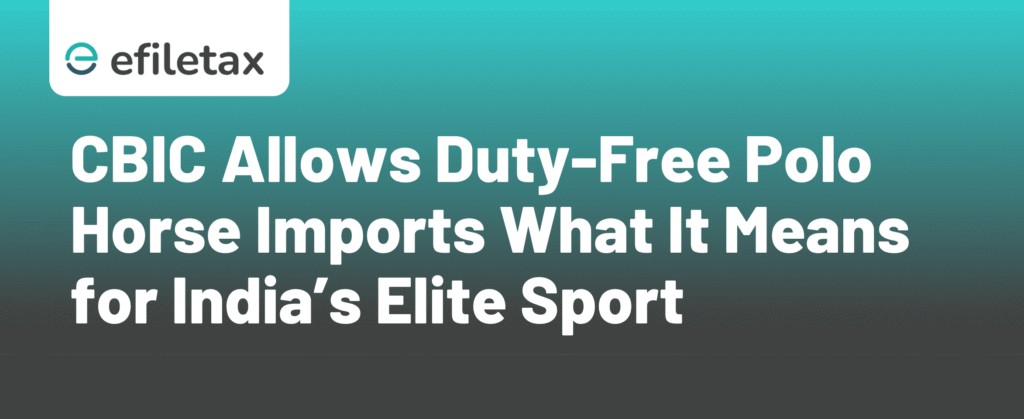
Duty-free horse import for polo has officially been permitted by the Central Board of Indirect Taxes and Customs (CBIC) with the introduction of Entry 10A in the customs exemption schedule. Effective 19 July 2025, this marks a policy shift aimed at reviving India’s equestrian sporting traditions—specifically polo—with strategic and cultural undertones.
Let’s break down what this exemption really means, who qualifies, and how the system is being tightly regulated to prevent misuse.
What is Entry 10A under CBIC Notification?
CBIC has notified Entry No. 10A under its exemption list, allowing duty-free import of horses for polo under specific eligibility and licensing conditions.
✅ Eligible Importers:
- Indian Army
- Indian Navy
- Central Armed Police Forces (CAPFs)
- Civilian polo players or teams certified by the Department of Sports, Ministry of Youth Affairs and Sports
📅 Effective Date:
- 19 July 2025
📄 Source Notification:
- Issued via official CBIC customs notification under the Customs Act, 1962
Key Conditions for Availing Duty-Free Polo Horse Import
To prevent misuse of this niche exemption, strict licensing norms are in place.
- Eligibility certificate required from the Department of Youth Affairs and Sports
- Horses must be used only for polo purposes
- No resale or commercial use allowed unless reclassified and duties paid
- Importer must maintain usage records and present them if asked
Legal Basis & Policy Intent
The exemption under Entry 10A is notified under powers granted by:
- Section 25(1) of the Customs Act, 1962
- The aim is to promote polo as a strategic sport with military relevance and heritage value
🧾 Expert View:
Polo, once a training tool for cavalry, still holds prestige among elite regiments. Supporting it via such targeted exemptions reflects a mix of sports diplomacy, military tradition, and soft power projection—a rare tax incentive blending culture and compliance.
Polo vs Global Trade Trends: A Selective Approach
While nations like the U.S. push for blanket free trade (e.g., 99% of U.S. goods exported to Indonesia are now tariff-free), India’s approach is selective and strategic:
| Country | Trade Policy | Focus Area |
|---|---|---|
| USA–Indonesia | Broad-based zero tariffs (99%) | Mass trade liberalisation |
| India | Polo horse exemption via Entry 10A | Elite sport, cultural/military roots |
Why This Matters
- Encourages civilian-military partnerships in polo
- Revives heritage sports with minimal fiscal cost
- Avoids blanket tax breaks—highly focused exemption
- Promotes India’s image in international polo circuits
Potential Risks and Compliance Checks
This exemption is not a free-for-all. Here’s what needs to be ensured:
- Proper vetting of importers by the Sports Ministry
- Monitoring usage to prevent tax evasion via horse resale
- Periodic policy reviews to assess impact and relevance
FAQs on Duty-Free Polo Horse Import
Q1: Can private clubs import horses under this exemption?
Only if they or their players are certified by the Department of Sports.
Q2: Are GST or other duties waived too?
This exemption covers basic customs duty. GST and other applicable levies may still apply unless otherwise notified.
Q3: What if the horse is later sold or used for breeding?
Then the importer must pay applicable customs duties as per reclassification norms.
Final Thoughts
India’s new duty-free import rule for polo horses is not about tax revenue loss—it’s about strategic symbolism. Polo remains deeply tied to the nation’s elite forces and heritage. By formalising this exemption with tight controls, CBIC has walked a fine line between cultural support and fiscal responsibility.
📌 Looking to import under customs exemptions?
Talk to the Efiletax team for expert compliance help on licensing, documentation, and post-import procedures.
👉 Visit Efiletax.in for customs advisory and import clearance services
Summary:
CBIC’s Entry 10A allows duty-free horse imports for polo use by certified military and civilian entities. Tight eligibility rules apply.